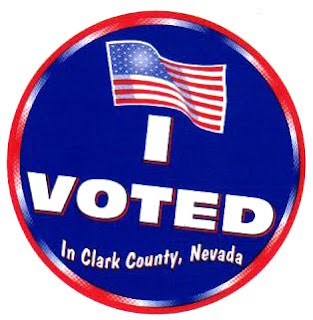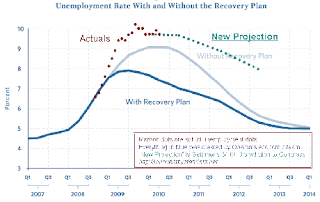
Survey: Liberals don't understand basic economics
Alternative headline: Actions of the Nevada Legislature - explained! (Geoff wrote about this yesterday, but it's so good I wanted to give you my take as well.)
Who is better informed about the policy choices facing the country - liberals, conservatives or libertarians? According to a Zogby International survey that I write about in the May issue of Econ Journal Watch, the answer is unequivocal: The left flunks Econ 101...There was also a big difference in economic understanding between the two major political parties.
How did the six ideological groups do overall? Here they are, best to worst, with an average number of incorrect responses from 0 to 8: Very conservative, 1.30; Libertarian, 1.38; Conservative, 1.67; Moderate, 3.67; Liberal, 4.69; Progressive/very liberal, 5.26.
Americans in the first three categories do reasonably well. But the left has trouble squaring economic thinking with their political psychology, morals and aesthetics.
The survey also asked about party affiliation. Those responding Democratic averaged 4.59 incorrect answers. Republicans averaged 1.61 incorrect, and Libertarians 1.26 incorrect.Read the whole thing to find out what questions the researchers asked and to test yourself.
Now, to be fair to liberals, Ed Morrissey of Hotair says the test questions seem subjective, but there's a much better test of liberals' economic abilities happening right now in the real world.
[W]e're getting a real-world demonstration of progressive economics over the last sixteen months. We don't need a Zogby survey to tell us that it fails; all we need to see are the job-creation numbers coming this year, and the precipitous drop in mortgage applications.From the housing tax credit to the stimulus to Nevada's billion-dollar tax hike to George W. Bush's Medicare giveaway, liberals of all parties don't understand economics. And we'll be paying for it in years to come.
Unfortunately for Nevada, during the 2009 legislative session our liberal legislative leadership understood full well that raising taxes would kill jobs - and did it anyway.
Academic survey finds progressives are economically illiterate
...as if this was some kind of secret.
Read my friend Max Borders' take.
Of course, we've been through all of this before, with FDR's economically fascist New Deal policies extending the Great Depression by seven years. It's amazing that modern-day progressives continue to pursue the same path of destruction despite the fact that every bit of economic and historical evidence is against them. It's almost as though they truly intend to lead us here.
School district transparency

According to the Sunshine Review - a watchdog group that oversees government transparency - Nevada's school districts receive a "D" for transparency.
The Sunshine Review finds, "No school district in the state managed an "A" grade. Washoe County School District ranked the highest with a "B", while Clark County School District received a "C" grade." The worst school district appears to be Humboldt County.
Check out the Sunshine Review's "Transparency Checklist" for more information on their methodology.
Why does Gary Payton live in Vegas?
For our non-basketball fan readers, Gary Payton was one of the best basketball players in the '90s and one of the greatest - if not the greatest -Sonics ever.
He's originally from California. So why does he live in Vegas and not his home state of California? Because Nevada doesn't have an income tax.
Payton isn't unique in moving away from high-tax states. Maryland, California and New Jersey have been experiencing it for years.
Update: I can't get the embedded video to load, so you're going to have to go the Sun and watch the video on their site.
Overpaid and abundant
There are too many overpaid government workres says Dan Mitchell of the Cato Institute.
School finance: Red vs. Blue

Over the last 40 years there have been 139 separate lawsuits in 45 states over state funding of K-12 education. As a result, courts have deemed school finance systems unconstitutional and inadequate in 28 states, forcing those states to increase per-pupil spending.
However, it has now been several years since a state has lost an "adequacy lawsuit" - owing to the fact that much evidence suggests increasing spending has not resulted in greater student achievement. Nevertheless, two researchers - Christopher Berry, a professor at the University of Chicago, and Charles Wyson, a law student at Stanford University - writing for Education Next, set out to uncover how partisan control of state politics affects the allocation of resources following a state's defeat in an adequacy lawsuit.
Examining spending levels in 23 states and 13,000 school districts between 1988 and 2005, the researches divided the states into three categories: states where the governorship and legislature were controlled by Democrats, states where politics was controlled by Republicans and states with divided governments. Each category was divided further into income groups: poor districts, two levels of middle-class districts and, finally, wealthy districts (each based on how many low-income students were in the district). The study produced some expected and unexpected results.
Not surprisingly, states under Democrat control experienced the largest increase in state spending for K-12 education. However, state increases in K-12 education were also offset by the largest decreases in local funding. Thus there was a trend among all income groups in Democrat-controlled states to centralize funding. Unexpectedly, however, was that the net increase - which was between $750 and $1,000 per pupil - was actually slightly higher in the wealthy districts than in the poorest districts.
Divided government produced smaller gains across all groups in terms of state spending, but the spending was clearly targeted to poorer districts. After subtracting local funding decreases, however, there was virtually no change in spending, although some districts actually experienced a decrease.
Republican control saw greater gains for poor districts, while Republicans also decreased state-level funding for wealthy districts - a result you might expect from Democrats. However, local funding increased for upper-middle and wealthy districts - something that did not occur under Democrats or divided government. The net increase in K-12 funding results in poor districts receiving more money than wealthy districts - something that did not occur in Democrat-controlled states. Although Democrats centralized spending across all income groups, Republicans appeared to centralize spending for low-income districts and decentralize spending for all other groups. It should be noted, however, that just three of the 23 states that lost an adequacy lawsuit were under Republican control.
The researchers conclude:
"Clearly, reforms implemented by Democrats produce the largest net increases in funding for all students. However, by delivering roughly equivalent funding increases to districts at all income levels, Democrat-led reforms do not target new resources to districts serving poor students. Reforms implemented by divided or Republican governments deliver concentrated benefits to districts serving poor students. In these instances, however, the actual flow of new dollars into poor districts is more meager than when Democrats are in control."
It's primary election day in Nevada

Remember to vote.
For information on the candidates, check out the RJ's "Meet the Candidates Guide."
For more election related resources, head over to Transparent Nevada.
Keynesian economist admits the stimulus failed
Yep, the stimulus has been such an epic failure that even well-known Keynesian economist Jeffrey Sachs admits that it failed. The money part comes at the very end, but it's worth watching the whole thing to hear Joe Scarborough try to defend Keynesian economics from the central idea of Keynesian economics.
If you're looking for some better economic theory, Joe, it's widely available.
Visit msnbc.com for breaking news, world news, and news about the economy
(h/t Hotair)
Nevada State Education Association endorses 47 Democrats ... 1 Republican
Alternative headline: How liberals define bipartisanship.
Anyway, there's nothing ground-breaking here, just a reminder that the teachers union is extremely liberal and cares more about increasing school funding than increasing student achievement.
So who's the Republican? Lt. Gov. Brian Krolicki, running for re-election. Not surprisingly, the office of Lt. Governor has very little impact on education policy.
In case you forgot, the stimulus was an epic failure
From today's unemployment data:
Job creation by private companies grew at the slowest pace of the year in May, even while the hiring of temporary census workers drove overall payrolls up 431,000. The unemployment rate dipped to 9.7 percent as many people gave up searching for work...Another month, another example of how badly the stimulus (which Obama promised would keep unemployment under 8 percent) failed.
Virtually all the job creation in May came from the hiring of 411,000 census workers. Such hiring peaked in May and will begin tailing off in June.
By contrast, hiring by private employers, the backbone of the economy, slowed sharply. They added just 41,000 jobs, down from 218,000 in April and the fewest since January.

Chart from Innocent Bystanders.
Take away: Keynesian economics don't work, but at least they give us cool econ rap videos.

 Read more
Read more